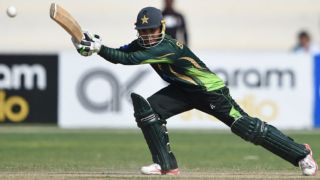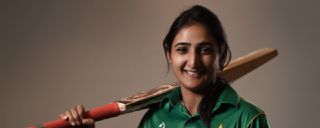The symbolism of the events leading up to the victory didn't go unnoticed. Sana Mir, removed from the captaincy in the wake of a very public spat with the management, rolled New Zealand over with a four-for, before providing rearguard action with the bat and scoring the winning runs, with Maroof at the other end.
"Sana is a fighter," Maroof says. "I've always believed that with or without the captaincy, whenever the team needs her she'll fight it out for the team. She has been under a lot of pressure since the World Cup and she converted that into a match-winning performance in a momentous win."
For Maroof herself, the months since the World Cup opener have been full of upheaval. Her tournament ended prematurely, with a fractured little finger in her right hand, and in the subsequent matches the batting unit fell apart - barring the occasional half-century from Nahida Khan and Ayesha Zafar.
Cricket had to be put on hold when she returned and underwent rehab for close to 40 days. More than anything, accepting the reality of it all was most difficult.
"The injury was untimely, and I had to stay away from cricket to clear the clutter in my head that the fracture brought," she says. "But I took my time and moved on. I disengaged myself from cricket for a good number of days and spent my time with family. That helped my soul-searching a bit.
"When I was offered captaincy, my family advised this could be right time for me to guide the team to more positive results. I took the role up as a challenge and I know it's going to be quite an experience."
Maroof has been the mainstay of a volatile batting order since her debut as a 15-year old, and against New Zealand made 35-plus scores in each of the three ODIs. She says captaincy hasn't put any extra pressure on her as a batsman, and that the ODI series has been a shot in the arm for the team.
"Yes, we should have won the first game too. Our lower middle order is relatively inexperienced, so after they fell, the tailenders got somewhat excited at the prospect of victory," she says, smiling. "But the biggest takeaway from the defeat was also what helped us win the third ODI and will do so in our upcoming games: take responsibility and close out the chase.
"It's a positive sign for Pakistan cricket. The better we perform, the better facilities we'll get from the board. And that's something we need to do for ourselves and for the next generation of women cricketers."
 Maroof attributes interim head coach Mark Coles with having begun the process of inculcating a new team culture.
Maroof attributes interim head coach Mark Coles with having begun the process of inculcating a new team culture.
"He's made it very clear that while we focus on our strengths, it important to accept our weaknesses and work on them. I think that way we're starting to be at peace with both the person and player we are as individuals."
On commentary during the third ODI, Coles said he was "no longer father to only his two daughters back in New Zealand" but, with the coaching role, now had "the responsibility of 14 more". Maroof reciprocates, calling him a "friend and fatherly figure" who, she says, has injected into the dressing room a degree of buoyancy that has multiplied trust among the players.
"It took him a while to understand the Pakistani culture [Coles jokingly terms it "excitable"]. He's been able to assess our mindset pretty quickly after that. Every girl knows they can walk up to him and speak their heart out. This uninhibited flow of communication is somewhat new to us.
"You could probably see that when we were making those calls while taking singles and doubles. A 'yes' meant a 'yes' and a 'no' meant a 'no'. It's basic stuff, really, but yes, it's starting to work for us."
Apart from Coles' empathy, Maroof believes he has imparted a sense of direction.
"Earlier, it was difficult to gather an understanding on the kind of approach we needed to adopt in key situations. With Mark coming in, he's clearly outlined the roles best suited to each one of us. Even the plans we chalk out on paper are followed up with due deliberations on how we should be executing them. This awareness he's instilled in us, mere khayal se hum log miss out kar rahein the iske pehle [in my opinion, we had been missing out previously]."
Now the full-time captain across formats, Maroof is alive to the challenges strewn across Pakistan's path. "Our top-order looks fairly settled. Our concern now is the No. 5 and 6 positions, and also our fielding - something Mark, too, has identified as needing improvement.
"The World Cup was testament to the growth the women's game has made. We are not yet at par with the best teams, but our aim now is to bridge that gap as quickly as possible. At the same time, we realise it's important to be patient. So we want to grow as a team and remodel ourselves as a better fielding, batting and bowling unit - one step at a time."

